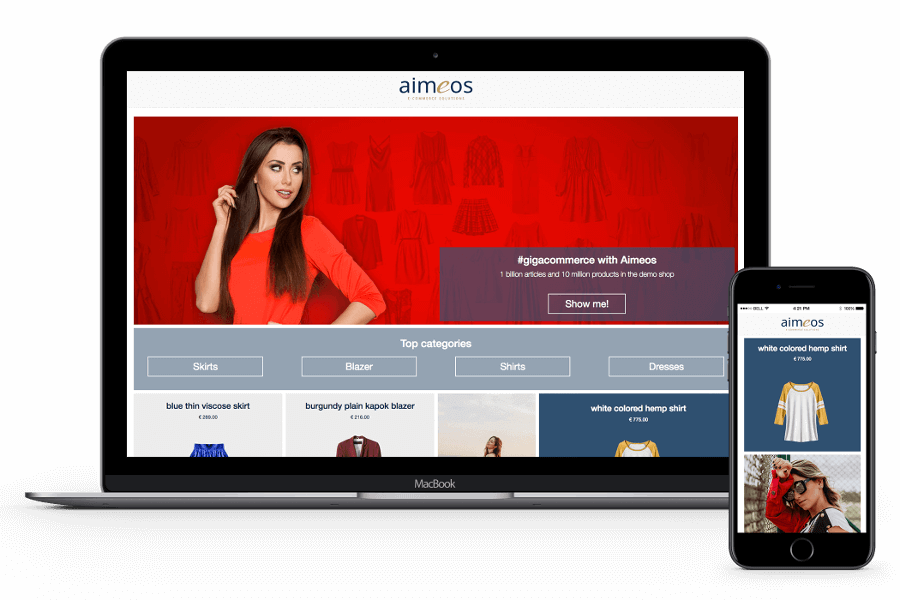
aimeos-symfony
Symfony e-commerce bundle for professional, ultra fast online shops, complex B2B applications and #gigacommerce
Stars: 475
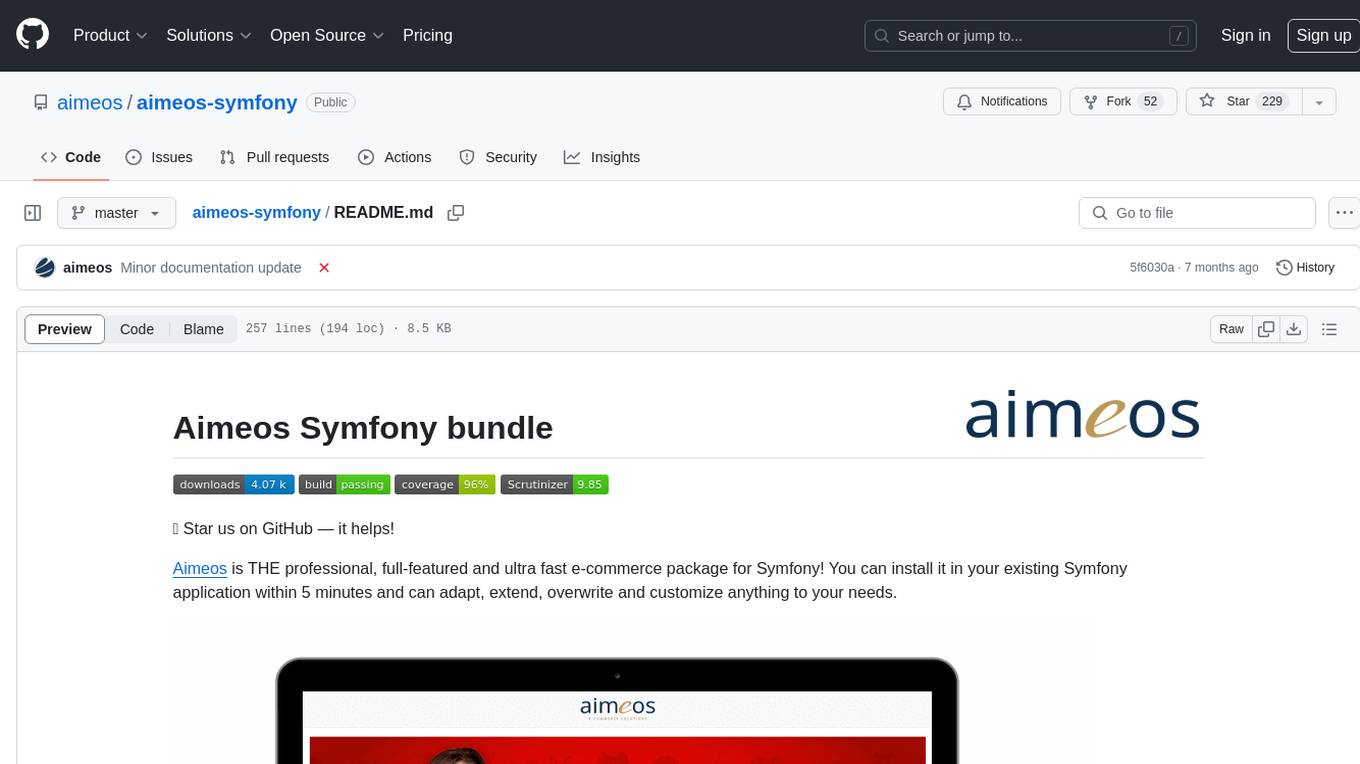
Aimeos Symfony bundle is a professional, full-featured, and ultra-fast e-commerce package for Symfony. It can be easily installed and customized within an existing Symfony application. The bundle provides comprehensive features for setting up an e-commerce platform, including authentication, routing configuration, database setup, and administration interface setup. It offers flexibility for adapting, extending, overwriting, and customizing various aspects to meet specific business needs. The bundle is designed to streamline the development process and provide a robust foundation for building e-commerce applications with Symfony.
README:
⭐ Star us on GitHub — it helps!
Aimeos is THE professional, full-featured and ultra fast e-commerce package for Symfony! You can install it in your existing Symfony application within 5 minutes and can adapt, extend, overwrite and customize anything to your needs.
This document is for the latest Aimeos 2023.10 and Symfony 6.3+.
If you want to upgrade between major versions, please have a look into the upgrade guide!
The Aimeos Symfony e-commerce bundle is a composer based library that can be installed easiest by using Composer. If you don't have an existing Symfony application, you can create a skeleton application using
composer create-project symfony/website-skeleton:~4.4 myshop
cd myshop
These settings need to be added to the ./config/packages/fos_user.yaml file:
fos_user:
db_driver: orm
user_class: Aimeos\ShopBundle\Entity\FosUser
firewall_name: aimeos_myaccount
from_email:
address: "[email protected]"
sender_name: "Test shop"
service:
mailer: 'fos_user.mailer.noop'The Aimeos components have to be configured as well to get authentication working correctly.
You need to take care of three things: Using the correct customer manager implementation and
password encryption method as well as the right path for the storages. All must be appended
at the end of the ./config/packages/aimeos_shop.yaml:
aimeos_shop:
resource:
fs:
baseurl: "https://yourdomain.com/"
basedir: "%kernel.project_dir%/public"
fs-admin:
basedir: "%kernel.project_dir%/public/uploads"
mshop:
customer:
manager:
name: FosUser
password:
name: BcryptTo configure the Aimeos routing, create the file ./config/routes/aimeos_shop.yaml with these lines:
aimeos_shop:
resource: "@AimeosShopBundle/config/routing.yaml"The same applies for the FosUser bundle. Create the file ./config/routes/fos_user.yaml containing:
fos_user:
resource: "@FOSUserBundle/Resources/config/routing/all.xml"Make sure that the database is set up and it is configured in your ./config/packages/doctrine.yaml:
parameters:
env(DATABASE_URL): ''
database_host: <your host/ip>
database_port: <your port>
database_name: <your database>
database_user: <db username>
database_password: <db password>Also, you have to configure your database credentials in the .env file:
DATABASE_URL=mysql://db_user:[email protected]:3306/db_name
If you want to use a database server other than MySQL, please have a look into the article about supported database servers and their specific configuration.
If you don't use Sendmail but SMTP for sending e-mails, you have to adapt the MAILER_URL
configuration in your .env file, e.g.:
MAILER_URL=smtp://smtp.mailtrap.io:2525?encryption=tls&auth_mode=login&username=...&password=...
Then add these lines to your composer.json of your Symfony project:
"prefer-stable": true,
"minimum-stability": "dev",
"require": {
"aimeos/aimeos-symfony": "~2023.10",
"friendsofsymfony/user-bundle": "^3.2",
...
},
"scripts": {
"post-install-cmd": [
"Aimeos\\ShopBundle\\Composer\\ScriptHandler::installBundle",
"Aimeos\\ShopBundle\\Composer\\ScriptHandler::setupDatabase",
...
],
"post-update-cmd": [
"Aimeos\\ShopBundle\\Composer\\ScriptHandler::installBundle",
"Aimeos\\ShopBundle\\Composer\\ScriptHandler::setupDatabase",
...
]
}Afterwards, install the Aimeos shop bundle using
composer update
In a production environment or if you don't want that the demo data gets installed, use the --no-dev option:
SYMFONY_ENV=prod composer update --no-dev
If you get an exception that the SensioGeneratorBundle isn't found, follow the
steps described in the
Aimeos Symfony forum post
Start the PHP web server in the base directory of your application to do some quick tests:
php -S 127.0.0.1:8000 -t public
Then, you should be able to call the catalog list page in your browser using
http://127.0.0.1:8000/shop
Setting up the administration interface is a matter of configuring the Symfony firewall to restrict access to the admin URLs.
Setting up the security configuration is the most complex part. The firewall
setup in ./config/packages/security.yaml should look like this one:
security:
providers:
aimeos:
entity: { class: Aimeos\ShopBundle\Entity\FosUser, property: username }
password_hashers:
Aimeos\ShopBundle\Entity\FosUser: bcrypt
firewalls:
aimeos_admin:
pattern: ^/admin
provider: aimeos
form_login:
login_path: /admin
check_path: /admin_check
aimeos_myaccount:
pattern: ^/
form_login:
provider: aimeos
csrf_token_generator: security.csrf.token_manager
logout: true
access_control:
- { path: ^/login$, role: IS_AUTHENTICATED_ANONYMOUSLY }
- { path: ^/register, role: IS_AUTHENTICATED_ANONYMOUSLY }
- { path: ^/resetting, role: IS_AUTHENTICATED_ANONYMOUSLY }
- { path: ^/profile, roles: ROLE_USER }
- { path: ^/admin/.+, roles: [ROLE_ADMIN, ROLE_SUPER_ADMIN] }Caution: The order of the configuration settings in this file is important!
These settings will protect the /admin/* URLs from unauthorized access from
someone without admin privileges.
The /profile URL is protected by the FOS user bundle as well, which also offers
user registration.
As last step, you have to create an admin account using the Symfony command line:
./bin/console aimeos:account --admin [email protected]The e-mail address is the user name for login and the account will work for the frontend too. To protect the new account, the command will ask you for a password. The same command can create limited accounts by using "--editor" instead of "--admin". If you use "--super" the account will have access to all sites.
If the PHP web server is still running (php -S 127.0.0.1:8000 -t public), you should be
able to call the admin login page in your browser using
http://127.0.0.1:8000/admin
and authenticating with your e-mail and the password which has been asked for by the
aimeos:account command.
To simplify development, you should configure to use no content cache. You can
do this by adding these lines to ./config/packages/aimeos_shop.yaml:
aimeos_shop:
madmin:
cache:
manager:
name: NoneThe Aimeos Symfony bundle is licensed under the terms of the MIT license and is available for free.
For Tasks:
Click tags to check more tools for each tasksFor Jobs:
Alternative AI tools for aimeos-symfony
Similar Open Source Tools

aimeos-symfony
Aimeos Symfony bundle is a professional, full-featured, and ultra-fast e-commerce package for Symfony. It can be easily installed and customized within an existing Symfony application. The bundle provides comprehensive features for setting up an e-commerce platform, including authentication, routing configuration, database setup, and administration interface setup. It offers flexibility for adapting, extending, overwriting, and customizing various aspects to meet specific business needs. The bundle is designed to streamline the development process and provide a robust foundation for building e-commerce applications with Symfony.

lexido
Lexido is an innovative assistant for the Linux command line, designed to boost your productivity and efficiency. Powered by Gemini Pro 1.0 and utilizing the free API, Lexido offers smart suggestions for commands based on your prompts and importantly your current environment. Whether you're installing software, managing files, or configuring system settings, Lexido streamlines the process, making it faster and more intuitive.
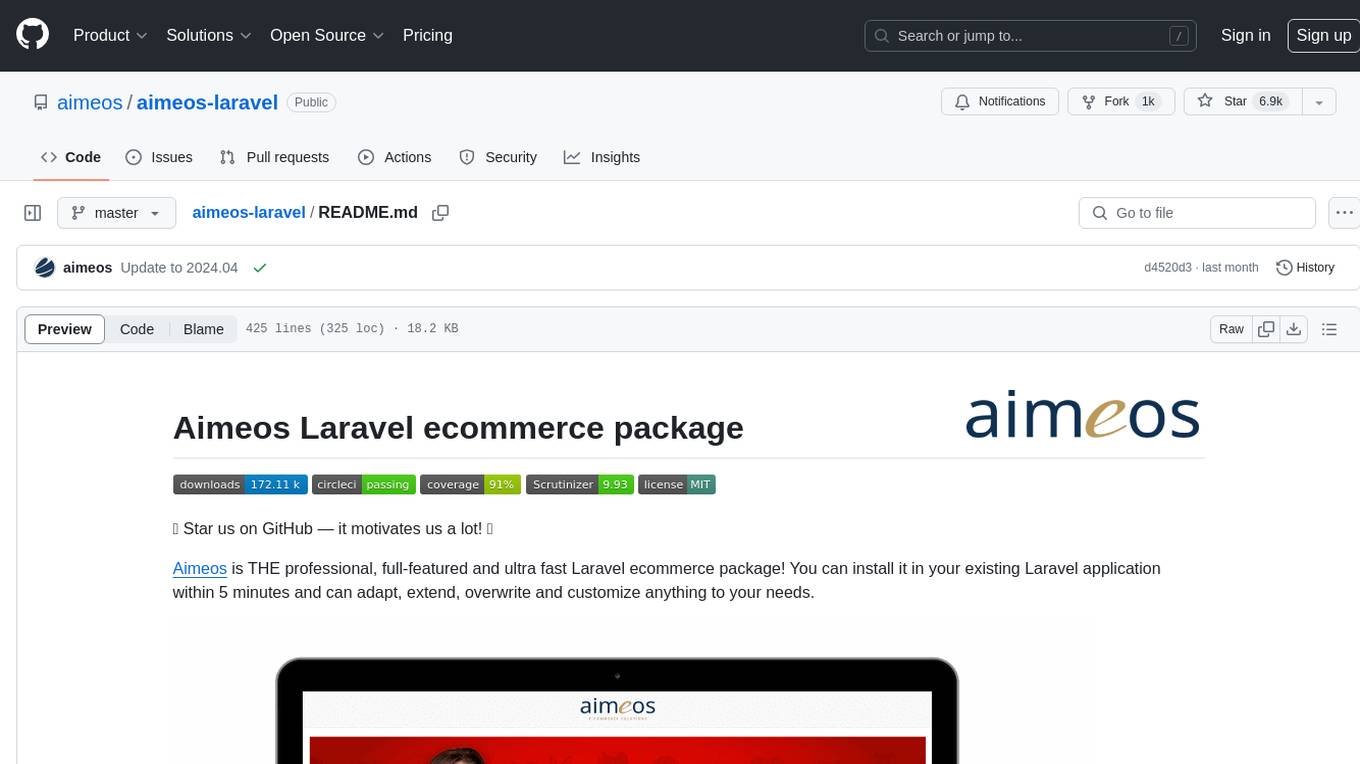
aimeos-laravel
Aimeos Laravel is a professional, full-featured, and ultra-fast Laravel ecommerce package that can be easily integrated into existing Laravel applications. It offers a wide range of features including multi-vendor, multi-channel, and multi-warehouse support, fast performance, support for various product types, subscriptions with recurring payments, multiple payment gateways, full RTL support, flexible pricing options, admin backend, REST and GraphQL APIs, modular structure, SEO optimization, multi-language support, AI-based text translation, mobile optimization, and high-quality source code. The package is highly configurable and extensible, making it suitable for e-commerce SaaS solutions, marketplaces, and online shops with millions of vendors.
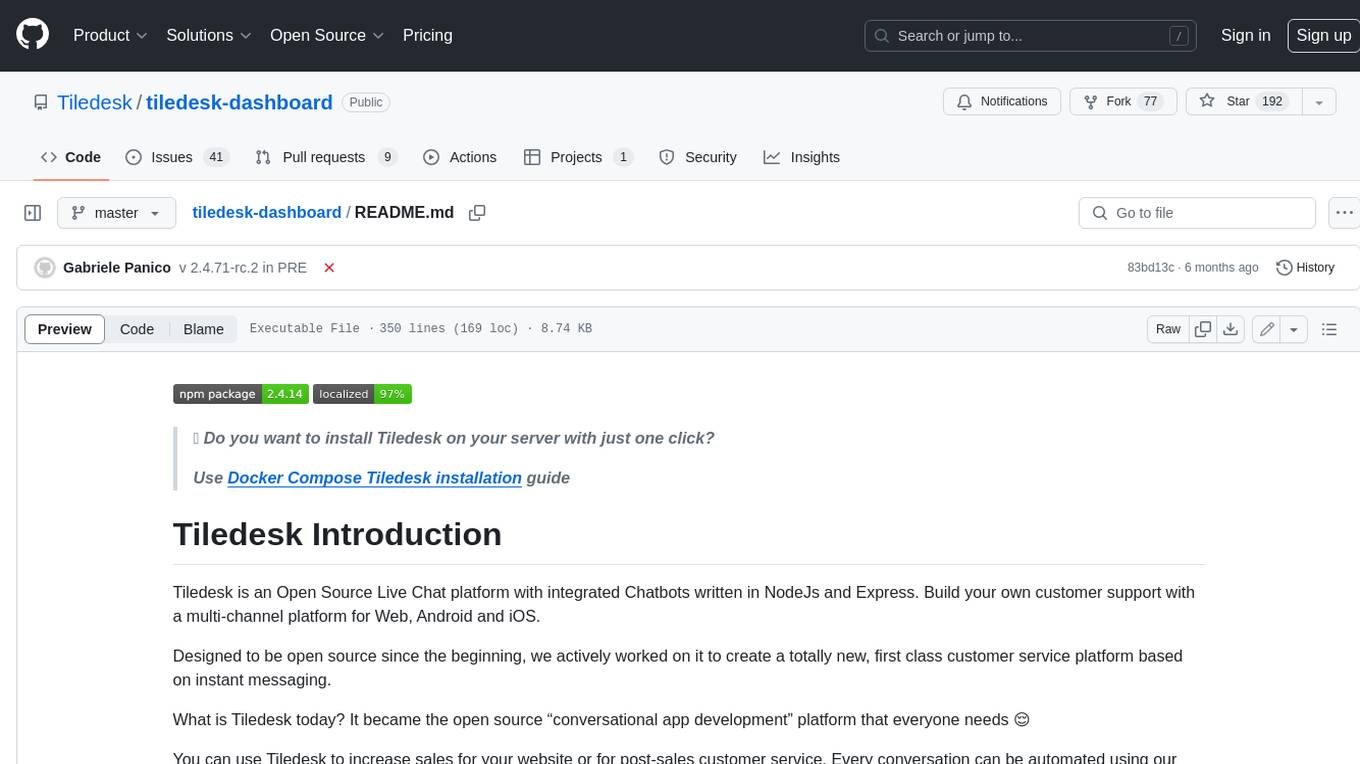
tiledesk-dashboard
Tiledesk is an open-source live chat platform with integrated chatbots written in Node.js and Express. It is designed to be a multi-channel platform for web, Android, and iOS, and it can be used to increase sales or provide post-sales customer service. Tiledesk's chatbot technology allows for automation of conversations, and it also provides APIs and webhooks for connecting external applications. Additionally, it offers a marketplace for apps and features such as CRM, ticketing, and data export.
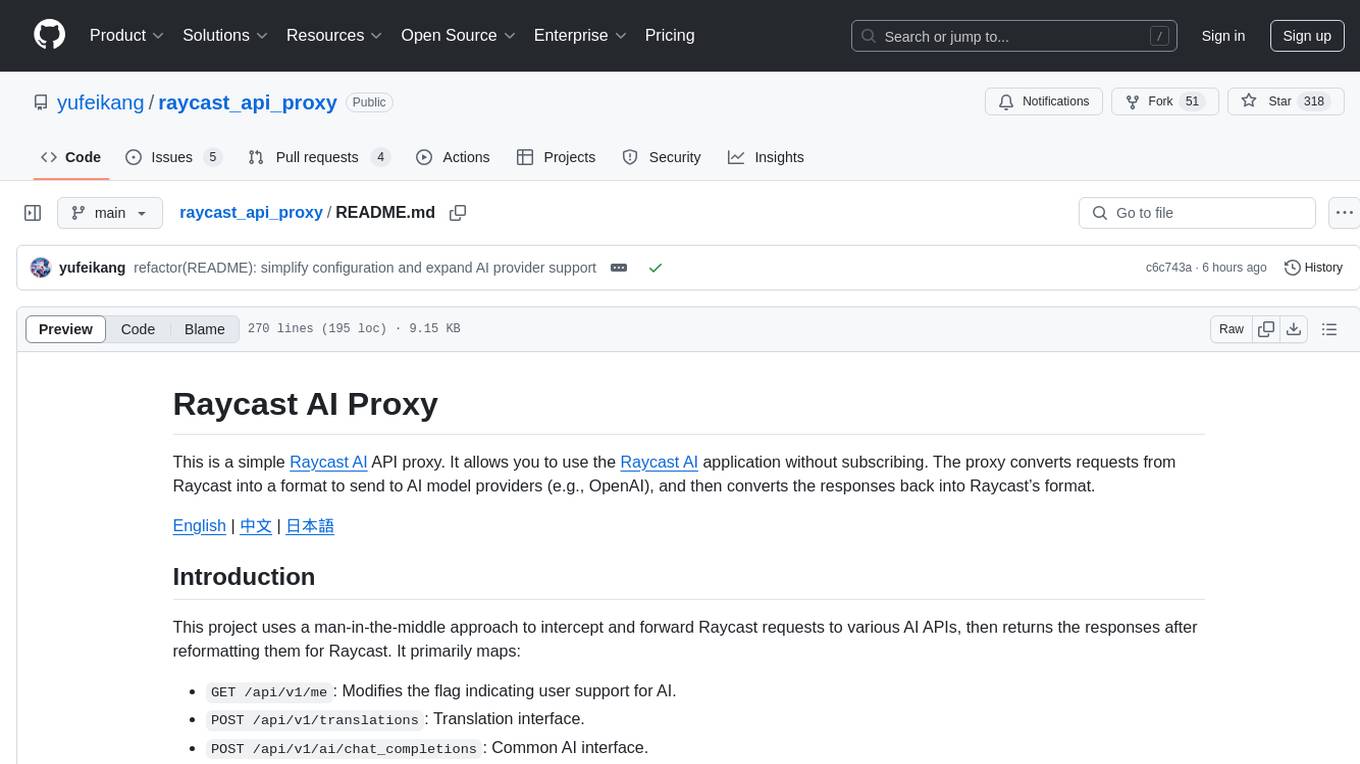
raycast_api_proxy
The Raycast AI Proxy is a tool that acts as a proxy for the Raycast AI application, allowing users to utilize the application without subscribing. It intercepts and forwards Raycast requests to various AI APIs, then reformats the responses for Raycast. The tool supports multiple AI providers and allows for custom model configurations. Users can generate self-signed certificates, add them to the system keychain, and modify DNS settings to redirect requests to the proxy. The tool is designed to work with providers like OpenAI, Azure OpenAI, Google, and more, enabling tasks such as AI chat completions, translations, and image generation.
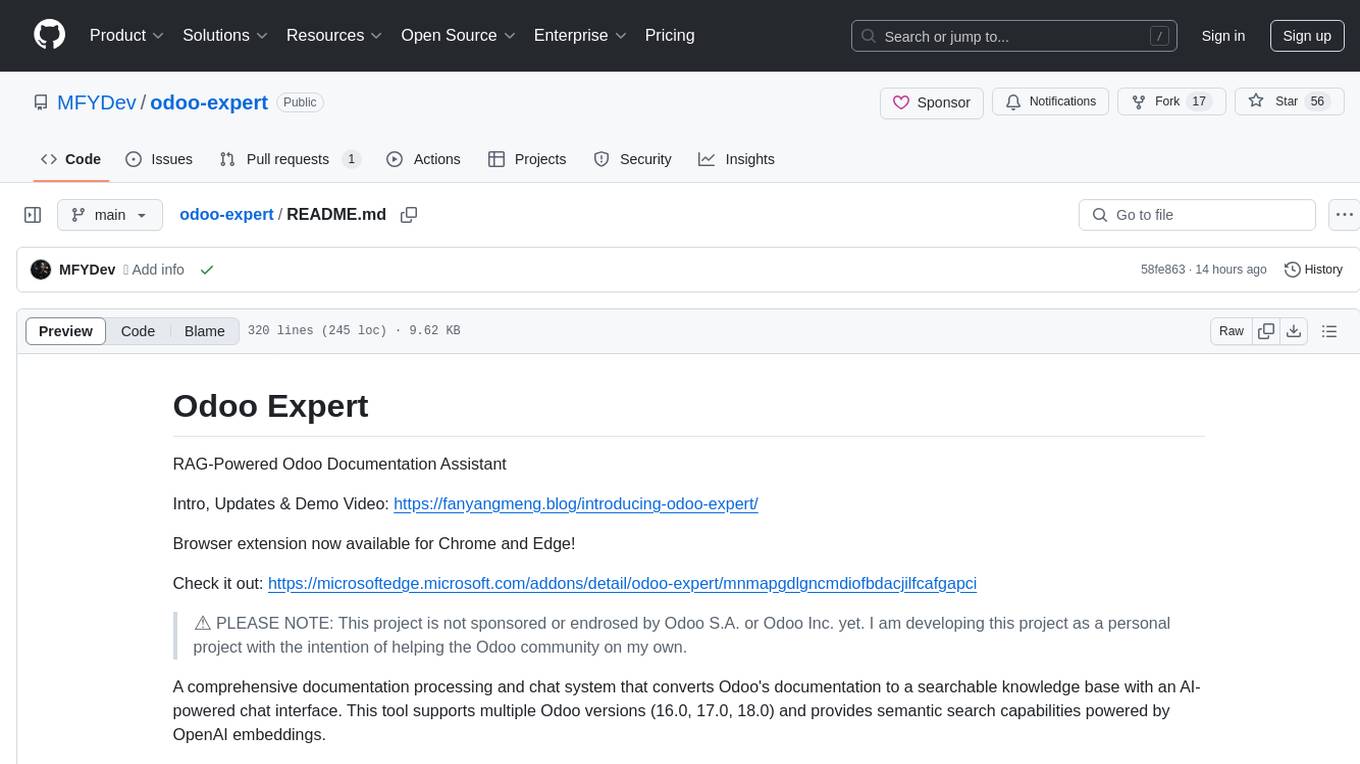
odoo-expert
RAG-Powered Odoo Documentation Assistant is a comprehensive documentation processing and chat system that converts Odoo's documentation to a searchable knowledge base with an AI-powered chat interface. It supports multiple Odoo versions (16.0, 17.0, 18.0) and provides semantic search capabilities powered by OpenAI embeddings. The tool automates the conversion of RST to Markdown, offers real-time semantic search, context-aware AI-powered chat responses, and multi-version support. It includes a Streamlit-based web UI, REST API for programmatic access, and a CLI for document processing and chat. The system operates through a pipeline of data processing steps and an interface layer for UI and API access to the knowledge base.
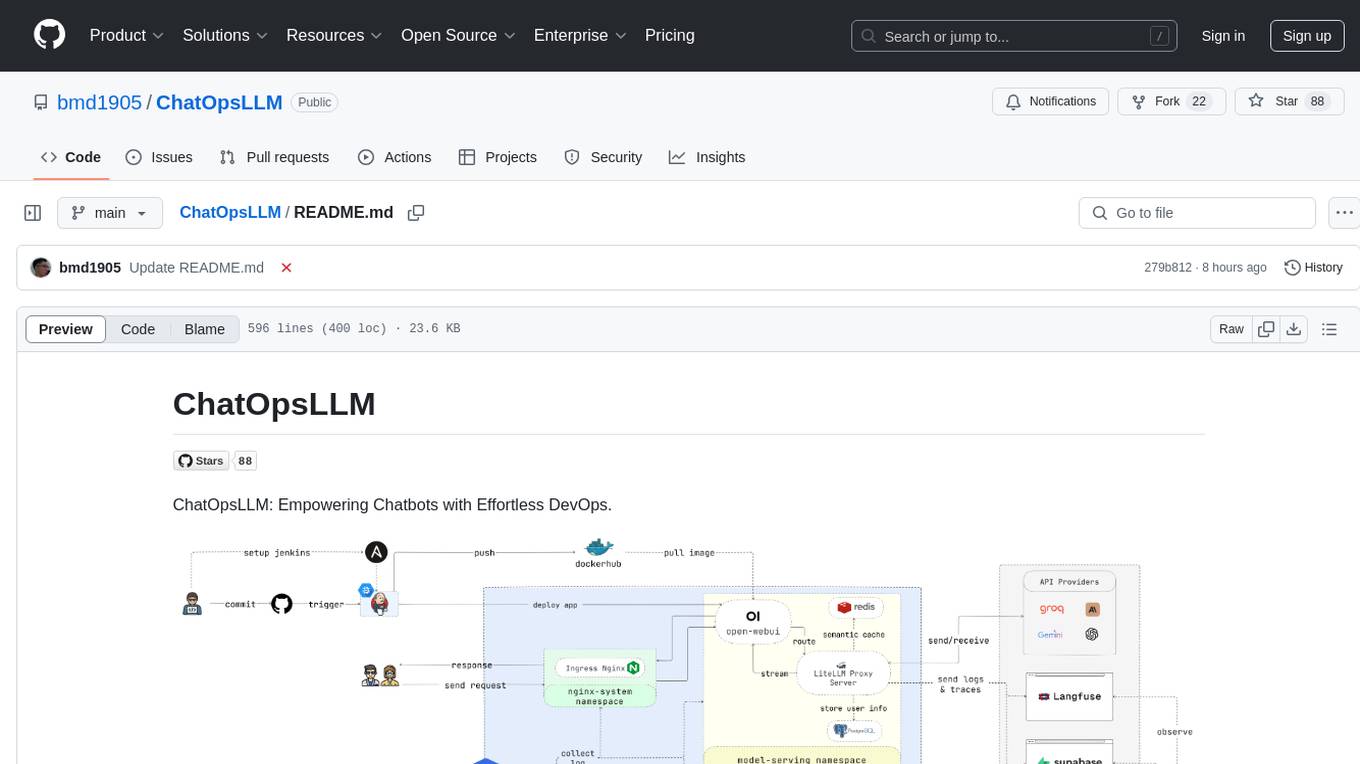
ChatOpsLLM
ChatOpsLLM is a project designed to empower chatbots with effortless DevOps capabilities. It provides an intuitive interface and streamlined workflows for managing and scaling language models. The project incorporates robust MLOps practices, including CI/CD pipelines with Jenkins and Ansible, monitoring with Prometheus and Grafana, and centralized logging with the ELK stack. Developers can find detailed documentation and instructions on the project's website.
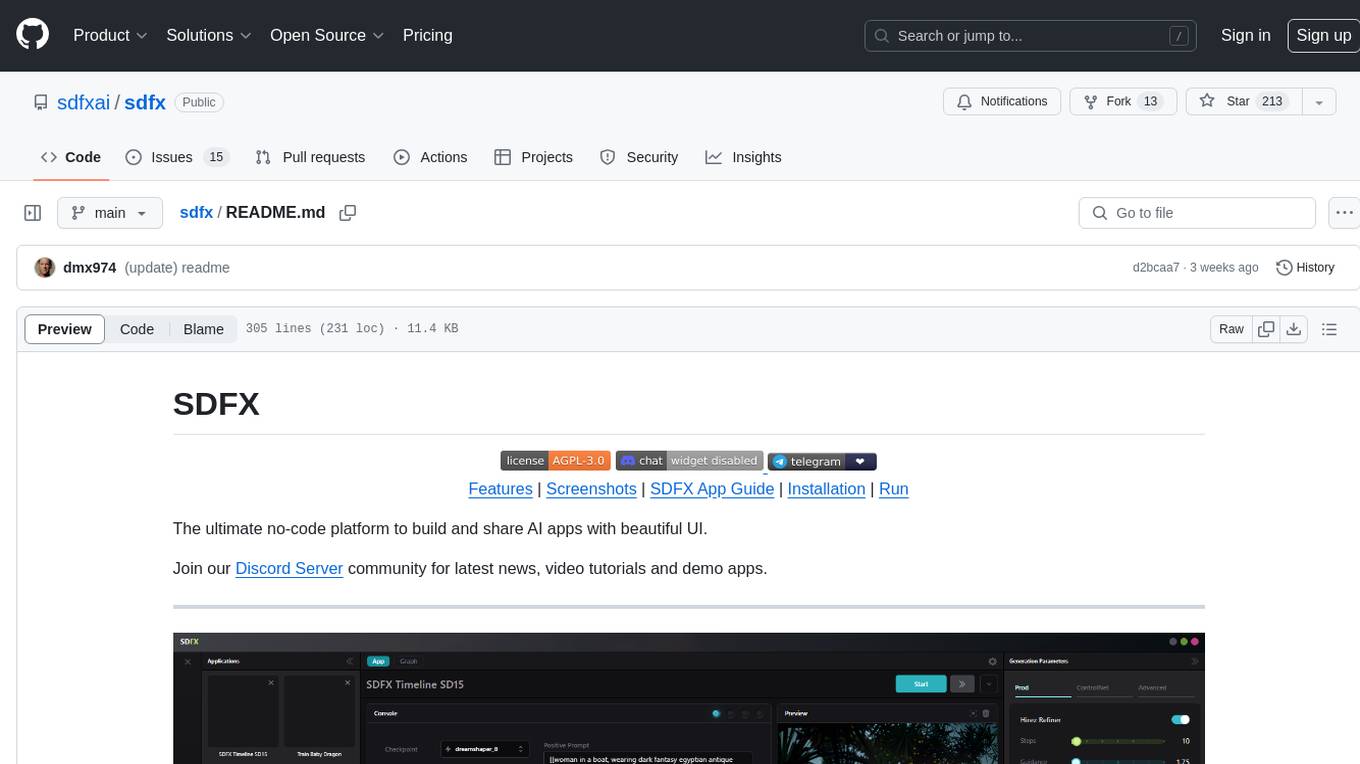
sdfx
SDFX is the ultimate no-code platform for building and sharing AI apps with beautiful UI. It enables the creation of user-friendly interfaces for complex workflows by combining Comfy workflow with a UI. The tool is designed to merge the benefits of form-based UI and graph-node based UI, allowing users to create intricate graphs with a high-level UI overlay. SDFX is fully compatible with ComfyUI, abstracting the need for installing ComfyUI. It offers features like animated graph navigation, node bookmarks, UI debugger, custom nodes manager, app and template export, image and mask editor, and more. The tool compiles as a native app or web app, making it easy to maintain and add new features.
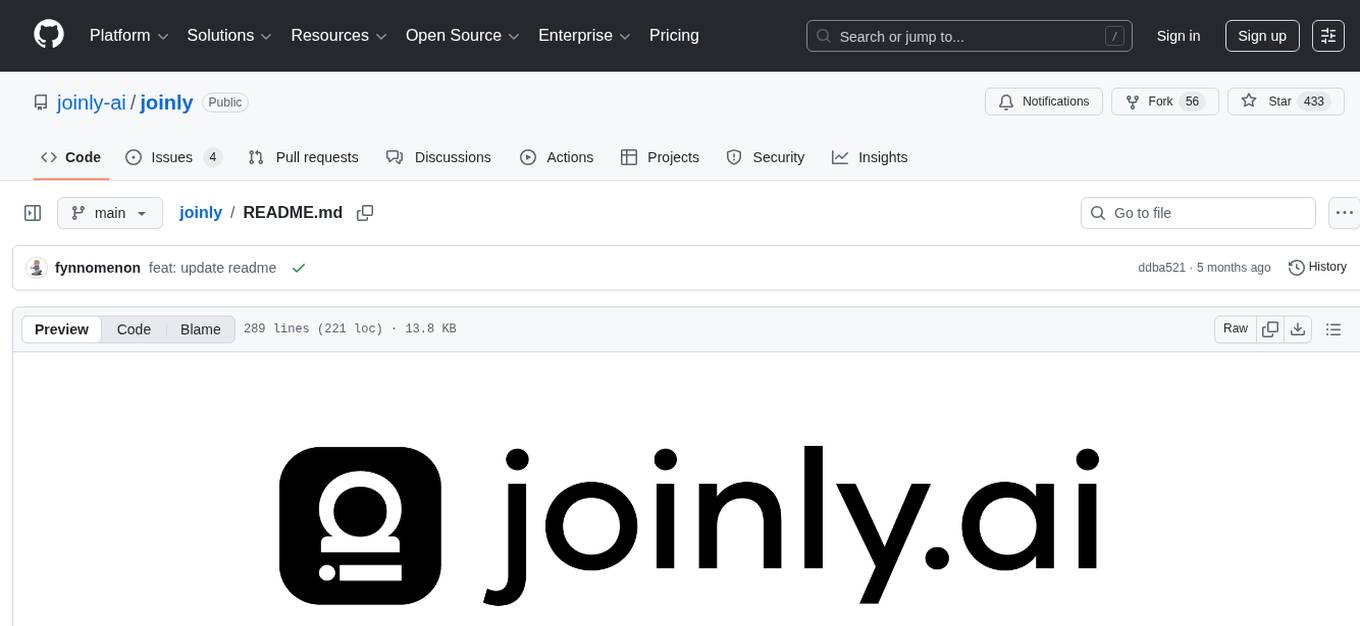
joinly
joinly.ai is a connector middleware designed to enable AI agents to actively participate in video calls, providing essential meeting tools for AI agents to perform tasks and interact in real time. It supports live interaction, conversational flow, cross-platform compatibility, bring-your-own-LLM, and choose-your-preferred-TTS/STT services. The tool is 100% open-source, self-hosted, and privacy-first, aiming to make meetings accessible to AI agents by joining and participating in video calls.
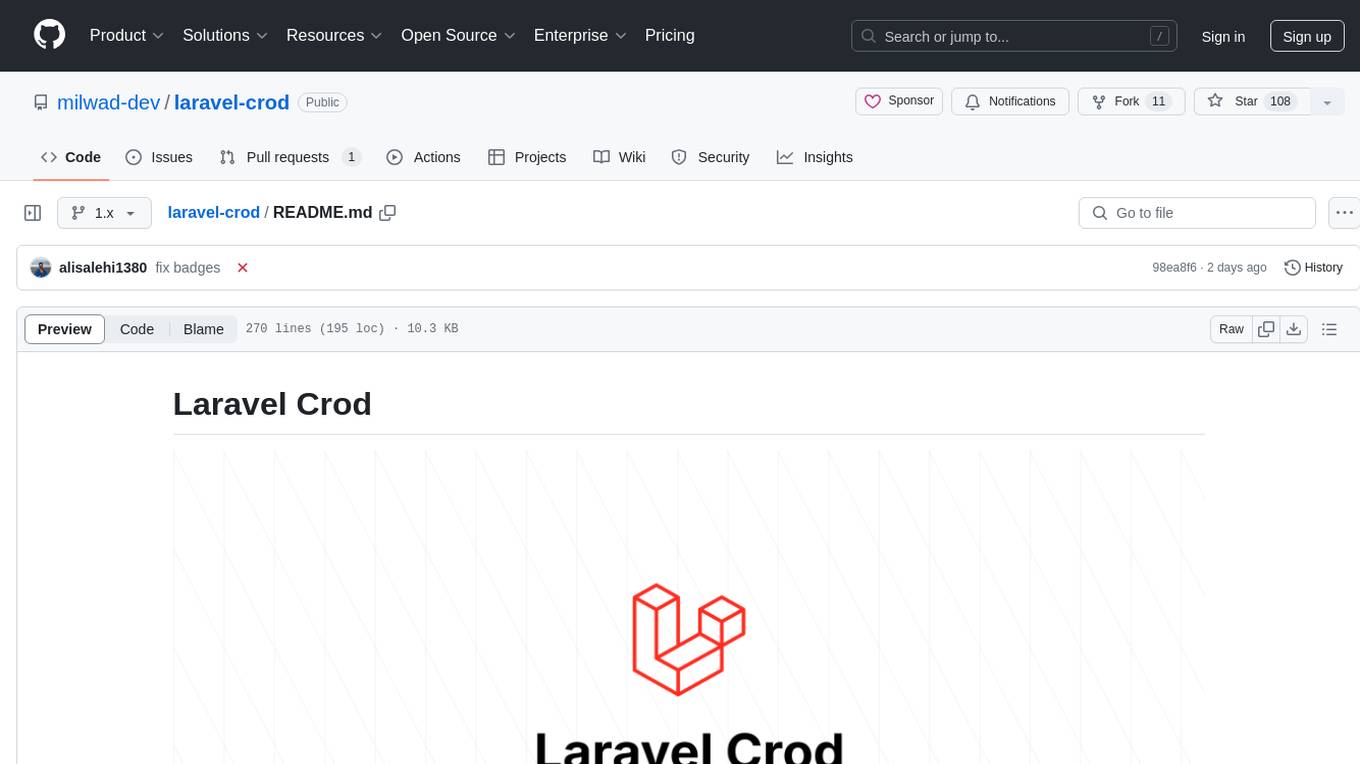
laravel-crod
Laravel Crod is a package designed to facilitate the implementation of CRUD operations in Laravel projects. It allows users to quickly generate controllers, models, migrations, services, repositories, views, and requests with various customization options. The package simplifies tasks such as creating resource controllers, making models fillable, querying repositories and services, and generating additional files like seeders and factories. Laravel Crod aims to streamline the process of building CRUD functionalities in Laravel applications by providing a set of commands and tools for developers.
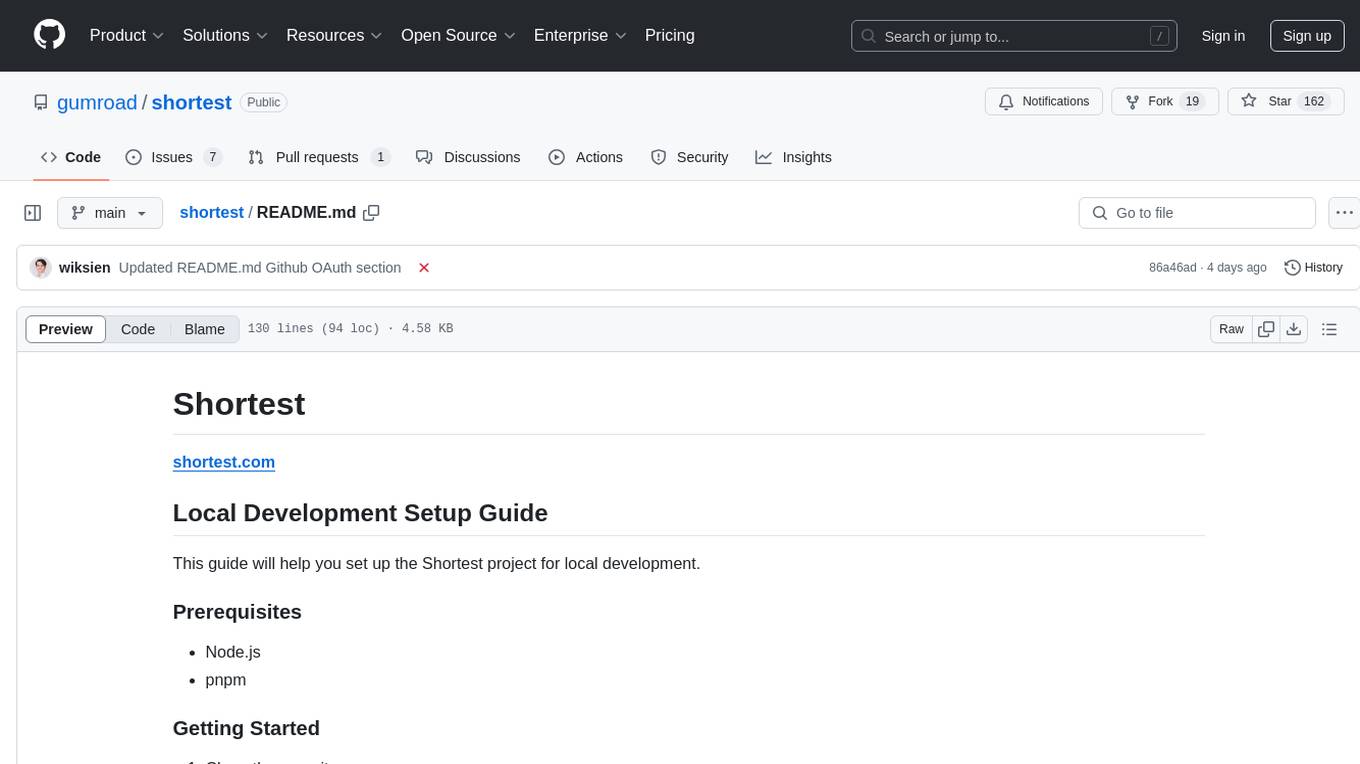
shortest
Shortest is a project for local development that helps set up environment variables and services for a web application. It provides a guide for setting up Node.js and pnpm dependencies, configuring services like Clerk, Vercel Postgres, Anthropic, Stripe, and GitHub OAuth, and running the application and tests locally.
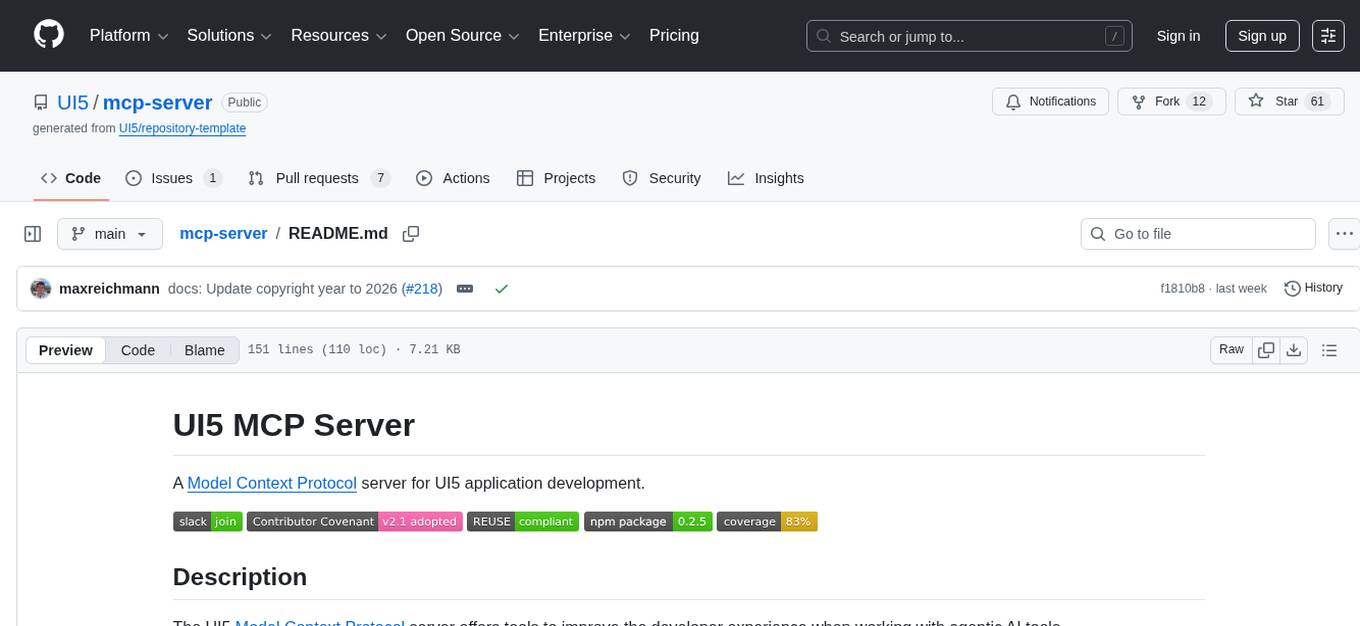
mcp-server
The UI5 Model Context Protocol server offers tools to improve the developer experience when working with agentic AI tools. It helps with creating new UI5 projects, detecting and fixing UI5-specific errors, and providing additional UI5-specific information for agentic AI tools. The server supports various tools such as scaffolding new UI5 applications, fetching UI5 API documentation, providing UI5 development best practices, extracting metadata and configuration from UI5 projects, retrieving version information for the UI5 framework, analyzing and reporting issues in UI5 code, offering guidelines for converting UI5 applications to TypeScript, providing UI Integration Cards development best practices, scaffolding new UI Integration Cards, and validating the manifest against the UI5 Manifest schema. The server requires Node.js and npm versions specified, along with an MCP client like VS Code or Cline. Configuration options are available for customizing the server's behavior, and specific setup instructions are provided for MCP clients like VS Code and Cline.
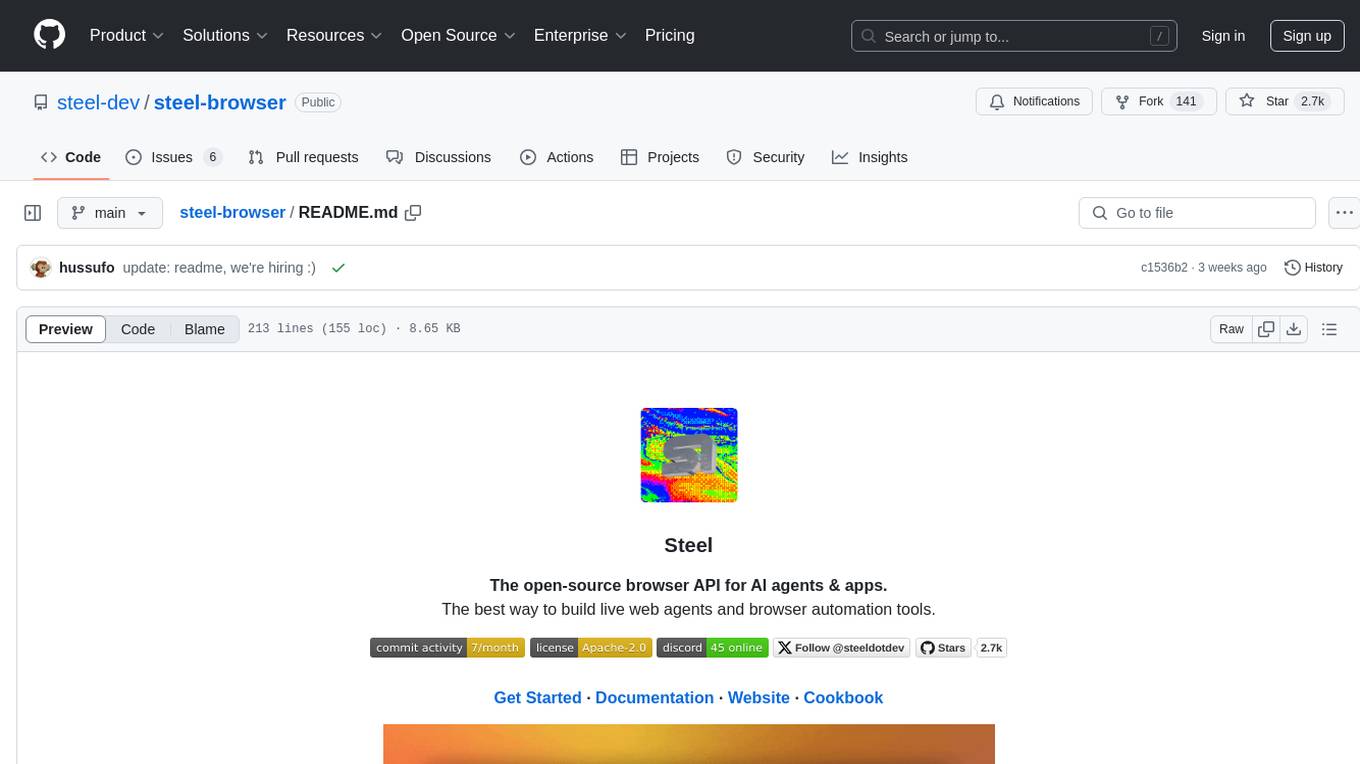
steel-browser
Steel is an open-source browser API designed for AI agents and applications, simplifying the process of building live web agents and browser automation tools. It serves as a core building block for a production-ready, containerized browser sandbox with features like stealth capabilities, text-to-markdown session management, UI for session viewing/debugging, and full browser control through popular automation frameworks. Steel allows users to control, run, and manage a production-ready browser environment via a REST API, offering features such as full browser control, session management, proxy support, extension support, debugging tools, anti-detection mechanisms, resource management, and various browser tools. It aims to streamline complex browsing tasks programmatically, enabling users to focus on their AI applications while Steel handles the underlying complexity.

DashAI
DashAI is a powerful tool for building interactive web applications with Python. It allows users to create data visualization dashboards and deploy machine learning models with ease. The tool provides a simple and intuitive way to design and customize web apps without the need for extensive front-end development knowledge. With DashAI, users can easily showcase their data analysis results and predictive models in a user-friendly and interactive manner, making it ideal for data scientists, developers, and business professionals looking to share insights and predictions with stakeholders.
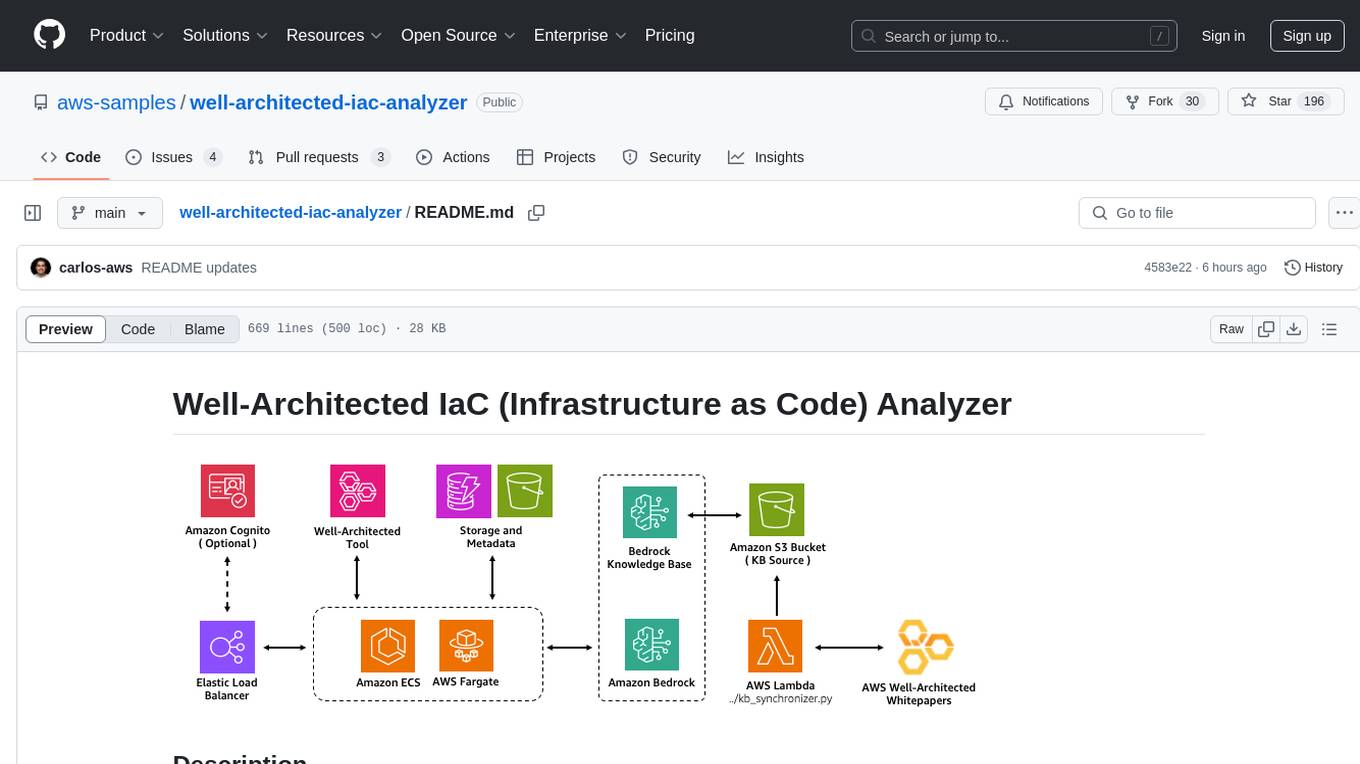
well-architected-iac-analyzer
Well-Architected Infrastructure as Code (IaC) Analyzer is a project demonstrating how generative AI can evaluate infrastructure code for alignment with best practices. It features a modern web application allowing users to upload IaC documents, complete IaC projects, or architecture diagrams for assessment. The tool provides insights into infrastructure code alignment with AWS best practices, offers suggestions for improving cloud architecture designs, and can generate IaC templates from architecture diagrams. Users can analyze CloudFormation, Terraform, or AWS CDK templates, architecture diagrams in PNG or JPEG format, and complete IaC projects with supporting documents. Real-time analysis against Well-Architected best practices, integration with AWS Well-Architected Tool, and export of analysis results and recommendations are included.
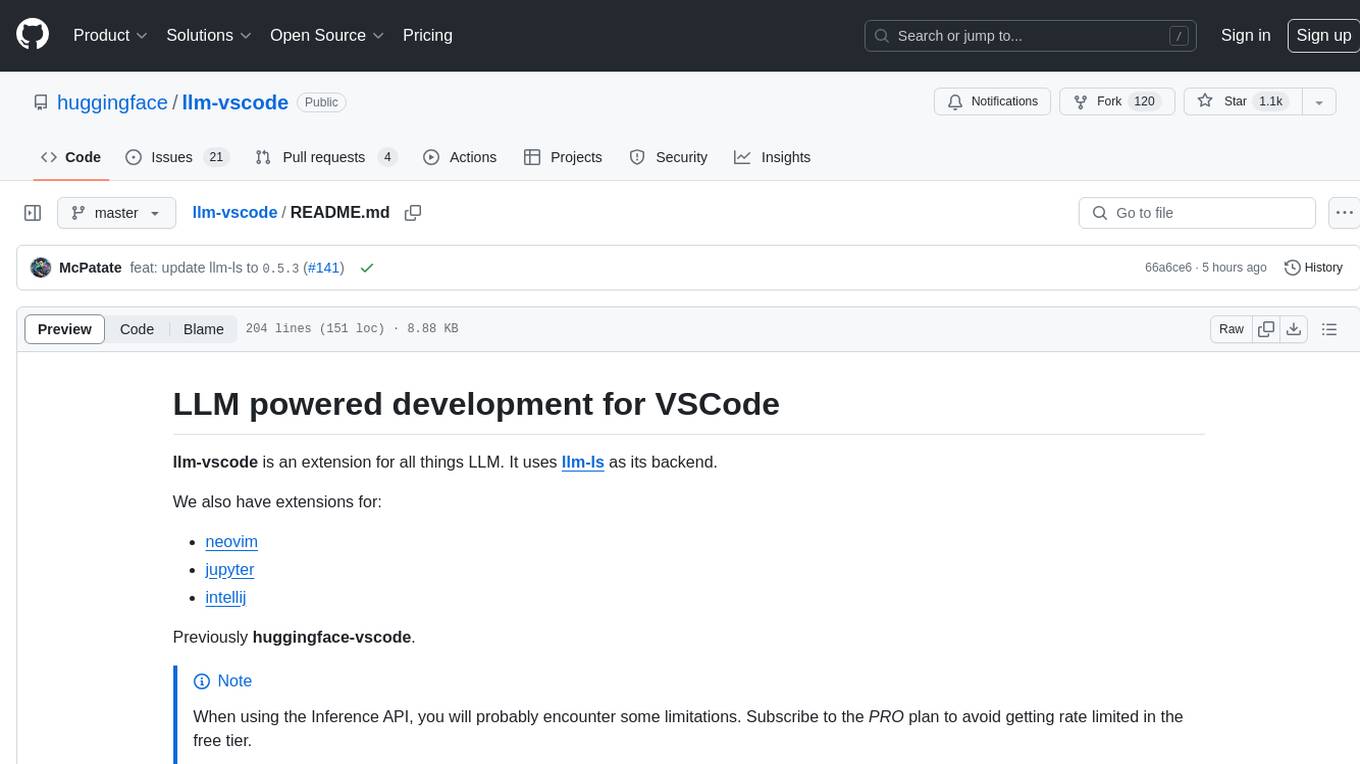
llm-vscode
llm-vscode is an extension designed for all things LLM, utilizing llm-ls as its backend. It offers features such as code completion with 'ghost-text' suggestions, the ability to choose models for code generation via HTTP requests, ensuring prompt size fits within the context window, and code attribution checks. Users can configure the backend, suggestion behavior, keybindings, llm-ls settings, and tokenization options. Additionally, the extension supports testing models like Code Llama 13B, Phind/Phind-CodeLlama-34B-v2, and WizardLM/WizardCoder-Python-34B-V1.0. Development involves cloning llm-ls, building it, and setting up the llm-vscode extension for use.
For similar tasks

aimeos-symfony
Aimeos Symfony bundle is a professional, full-featured, and ultra-fast e-commerce package for Symfony. It can be easily installed and customized within an existing Symfony application. The bundle provides comprehensive features for setting up an e-commerce platform, including authentication, routing configuration, database setup, and administration interface setup. It offers flexibility for adapting, extending, overwriting, and customizing various aspects to meet specific business needs. The bundle is designed to streamline the development process and provide a robust foundation for building e-commerce applications with Symfony.
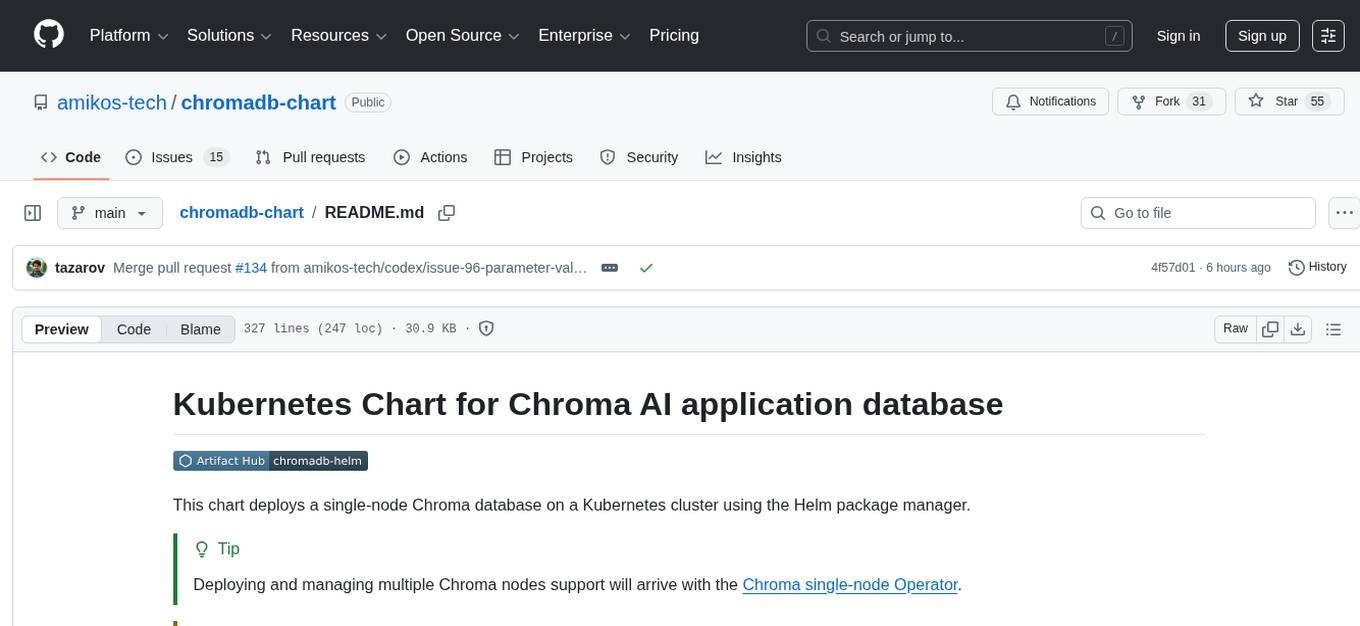
chromadb-chart
Chromadb-chart is a Kubernetes Chart for deploying a single-node Chroma AI application database on a Kubernetes cluster using the Helm package manager. It provides the ability to secure Chroma API with TLS, backup and restore index data, and monitor the cluster using Prometheus and Grafana. The chart configuration values allow customization of ChromaDB version, data persistence, telemetry, authentication, logging, image settings, and more. Users can verify installation, build Docker images, set up a Kubernetes cluster, and configure Chroma authentication using token or basic auth. The chart can also be used as a dependency in other charts, and extra config options are available for Rust server configurations.
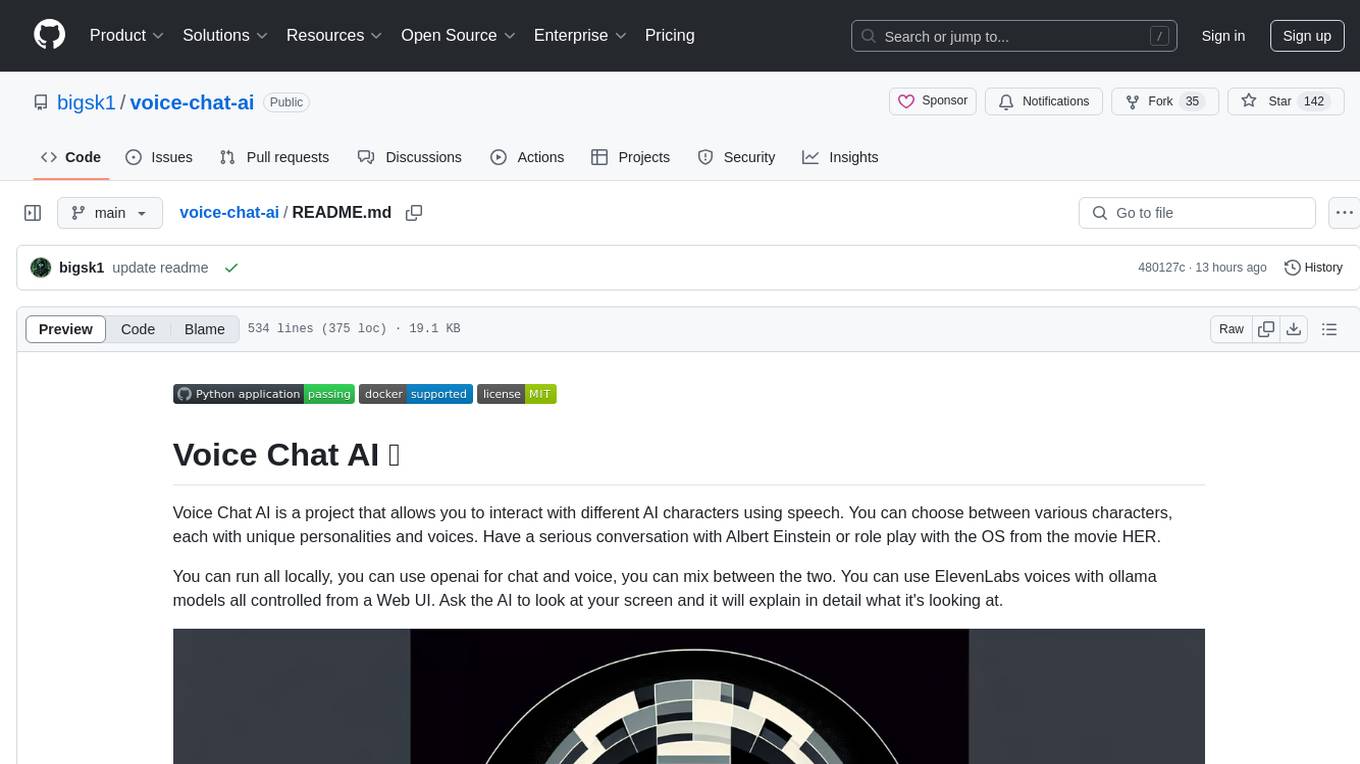
voice-chat-ai
Voice Chat AI is a project that allows users to interact with different AI characters using speech. Users can choose from various characters with unique personalities and voices, and have conversations or role play with them. The project supports OpenAI, xAI, or Ollama language models for chat, and provides text-to-speech synthesis using XTTS, OpenAI TTS, or ElevenLabs. Users can seamlessly integrate visual context into conversations by having the AI analyze their screen. The project offers easy configuration through environment variables and can be run via WebUI or Terminal. It also includes a huge selection of built-in characters for engaging conversations.
For similar jobs

aimeos-symfony
Aimeos Symfony bundle is a professional, full-featured, and ultra-fast e-commerce package for Symfony. It can be easily installed and customized within an existing Symfony application. The bundle provides comprehensive features for setting up an e-commerce platform, including authentication, routing configuration, database setup, and administration interface setup. It offers flexibility for adapting, extending, overwriting, and customizing various aspects to meet specific business needs. The bundle is designed to streamline the development process and provide a robust foundation for building e-commerce applications with Symfony.
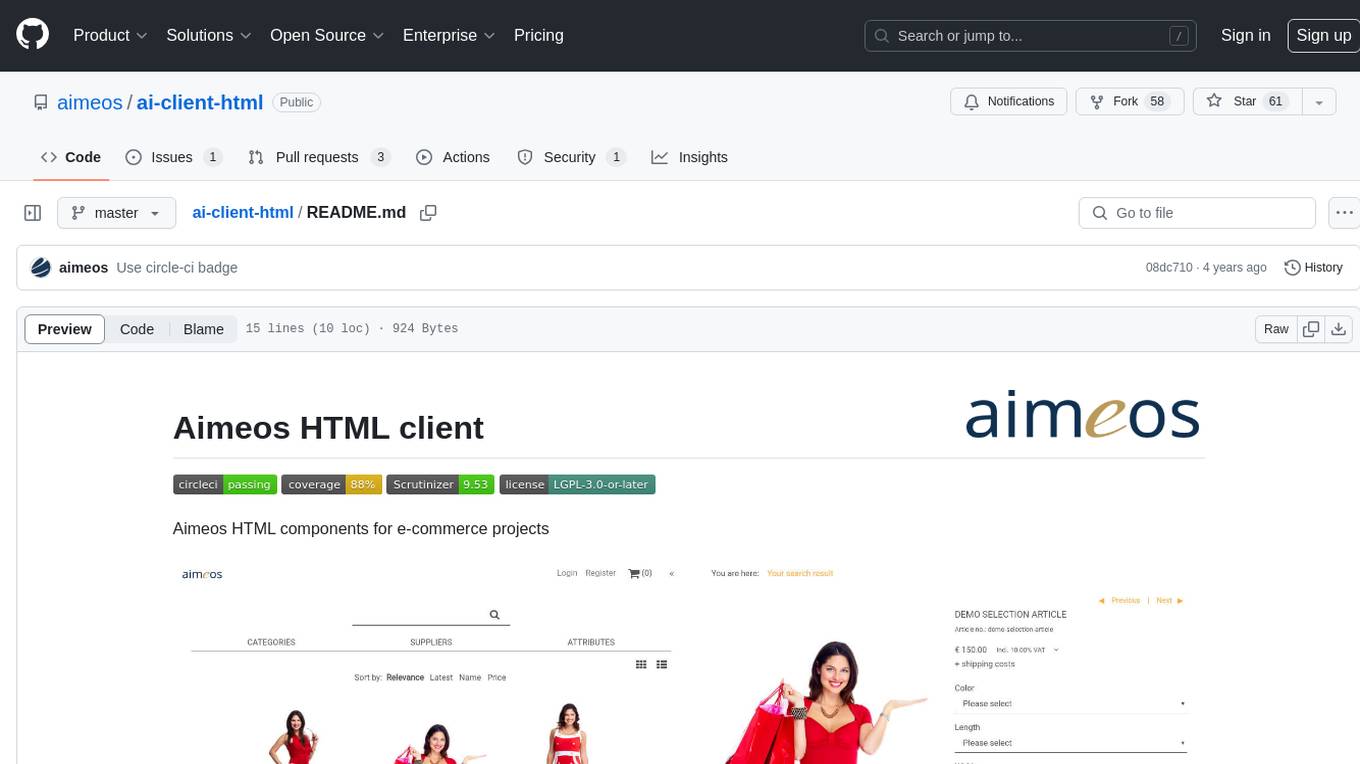
ai-client-html
The ai-client-html repository contains HTML components for e-commerce projects. It provides a set of tools and functionalities that can be used to build user interfaces for online stores. The components are designed to be customizable and easy to integrate into various web applications, making it suitable for developers working on e-commerce projects.
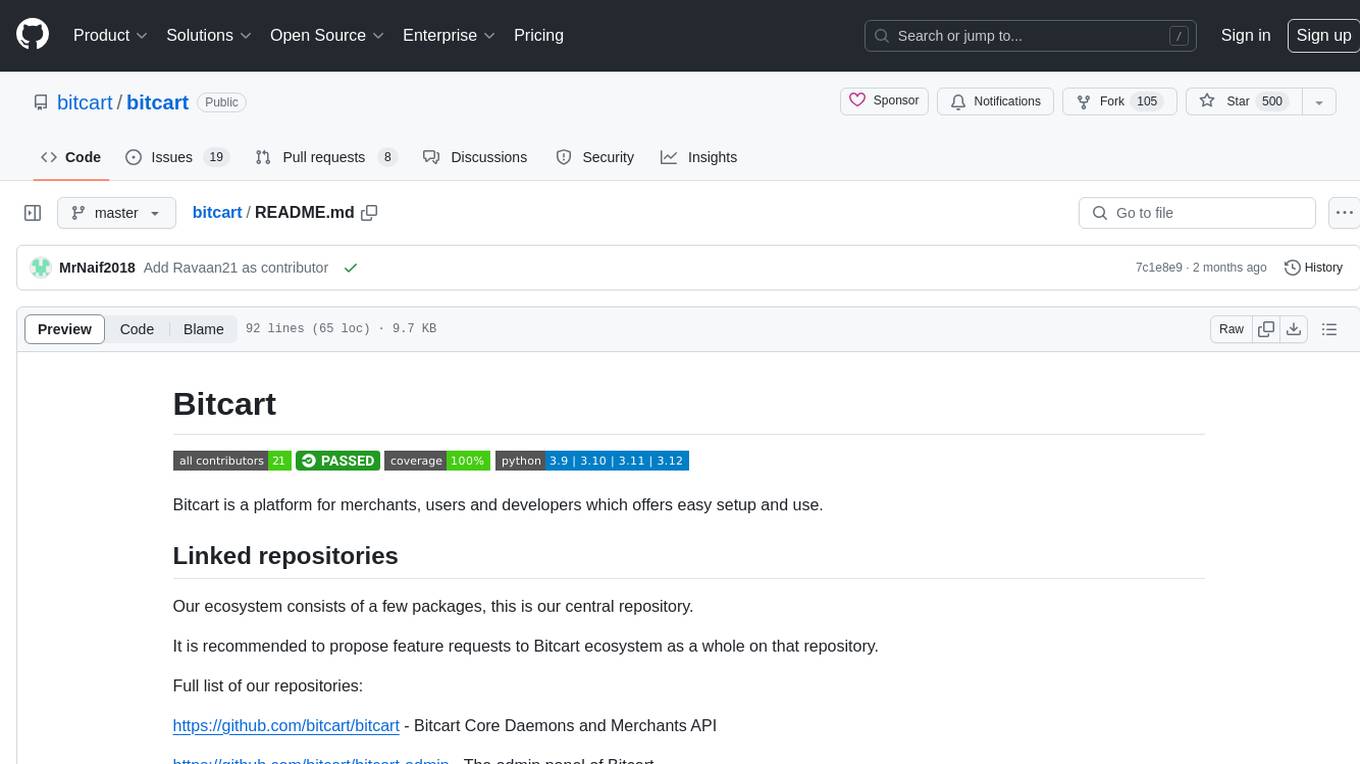
bitcart
Bitcart is a platform designed for merchants, users, and developers, providing easy setup and usage. It includes various linked repositories for core daemons, admin panel, ready store, Docker packaging, Python library for coins connection, BitCCL scripting language, documentation, and official site. The platform aims to simplify the process for merchants and developers to interact and transact with cryptocurrencies, offering a comprehensive ecosystem for managing transactions and payments.
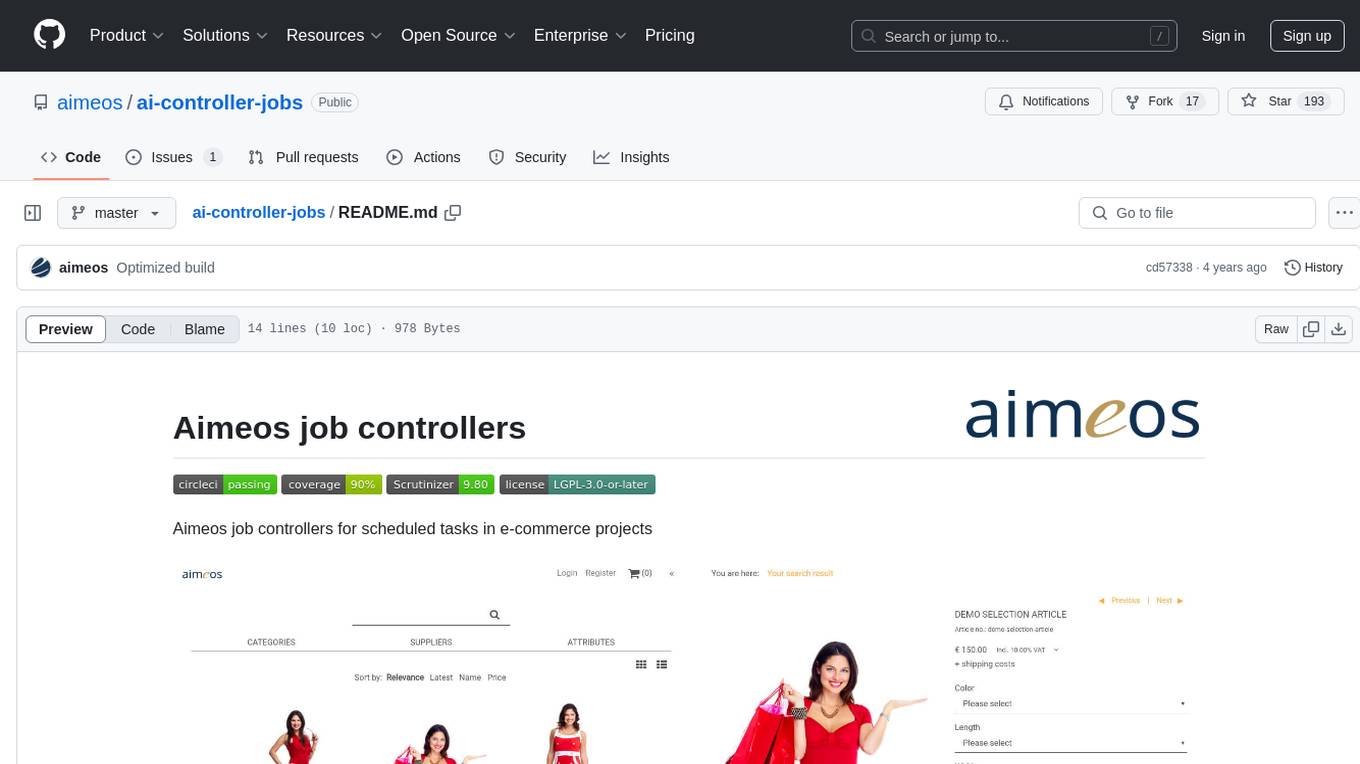
ai-controller-jobs
Aimeos job controllers is a repository containing controllers for scheduled tasks in e-commerce projects. It provides a set of tools to manage and execute various jobs related to e-commerce operations. The controllers are designed to streamline the process of handling scheduled tasks within e-commerce platforms, ensuring efficient and reliable task execution.
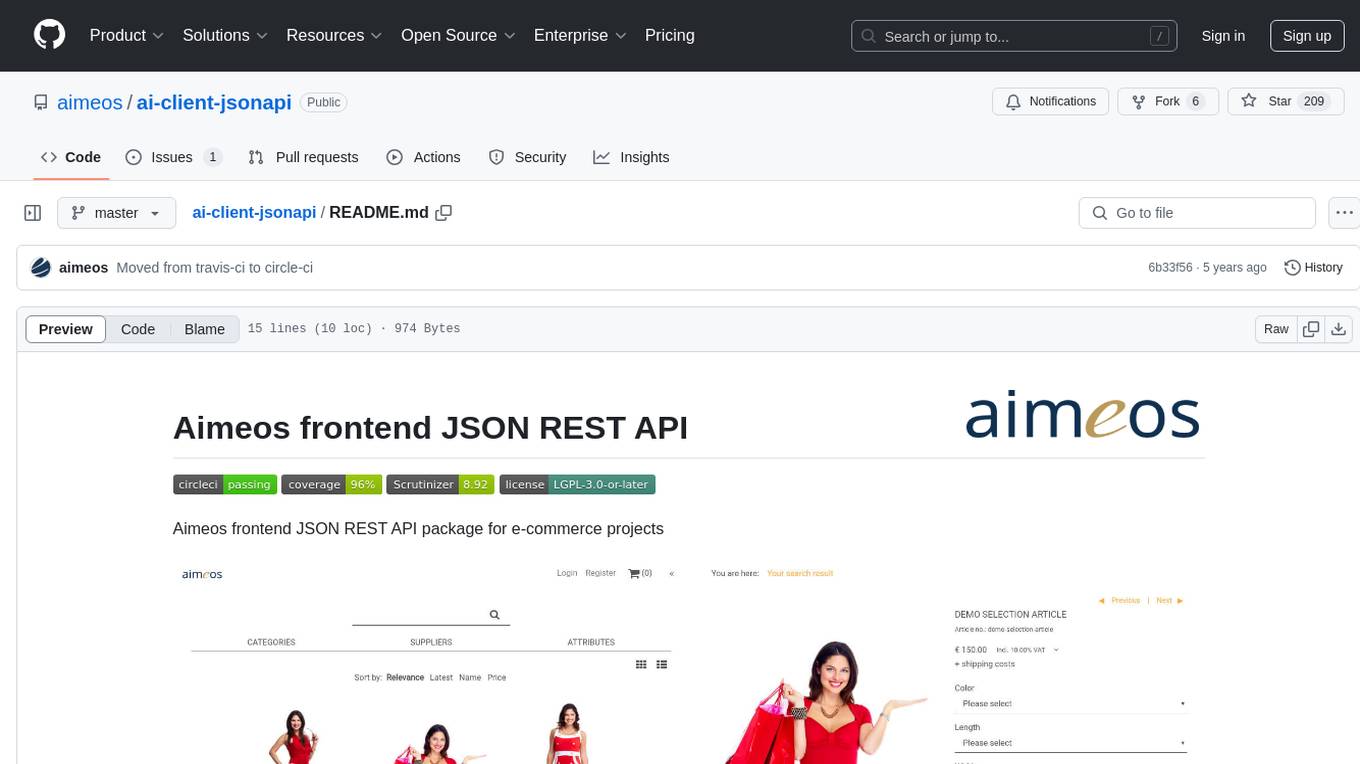
ai-client-jsonapi
Aimeos frontend JSON REST API is a package designed for e-commerce projects, providing a convenient way to interact with the backend server through JSON format. It offers a set of endpoints that allow users to perform various operations such as retrieving product information, managing shopping carts, and processing orders. The API is built with a focus on performance, scalability, and ease of use, making it suitable for both small and large e-commerce applications.
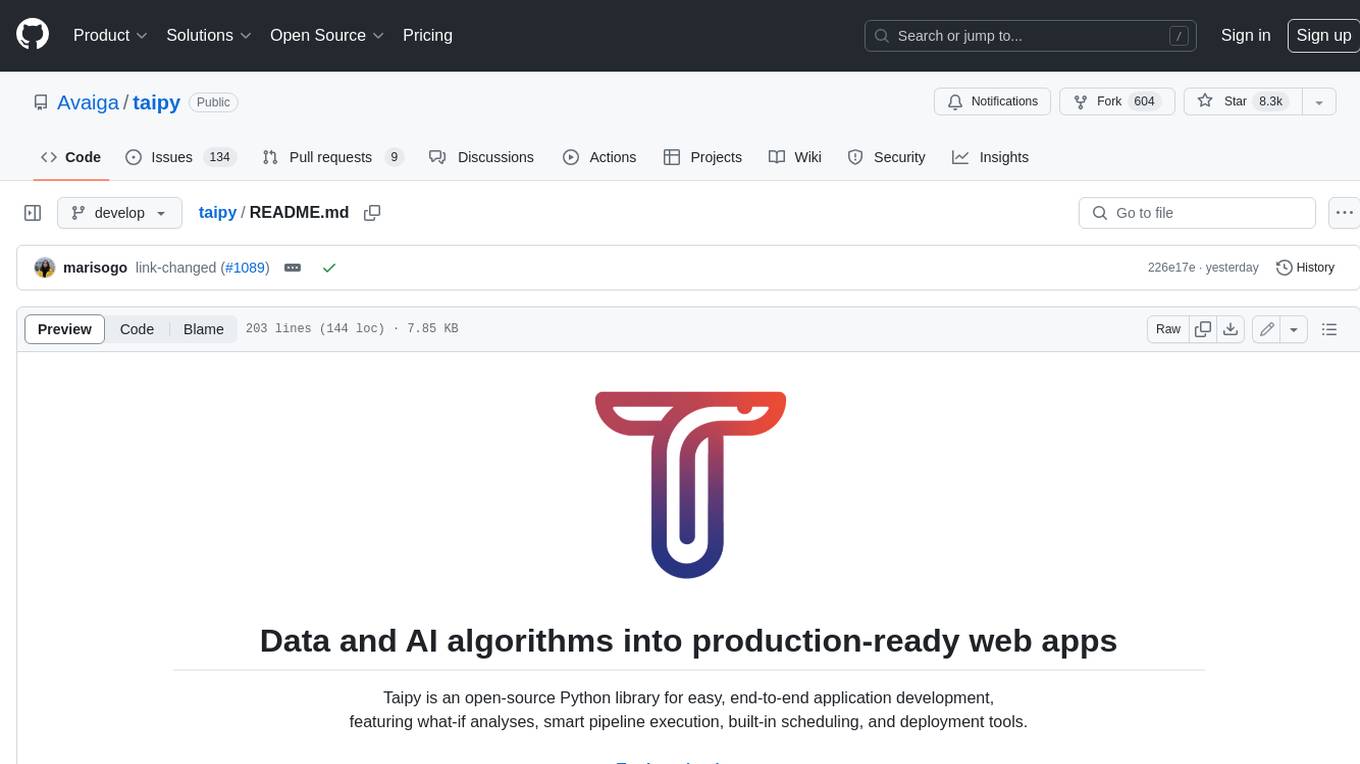
taipy
Taipy is an open-source Python library for easy, end-to-end application development, featuring what-if analyses, smart pipeline execution, built-in scheduling, and deployment tools.
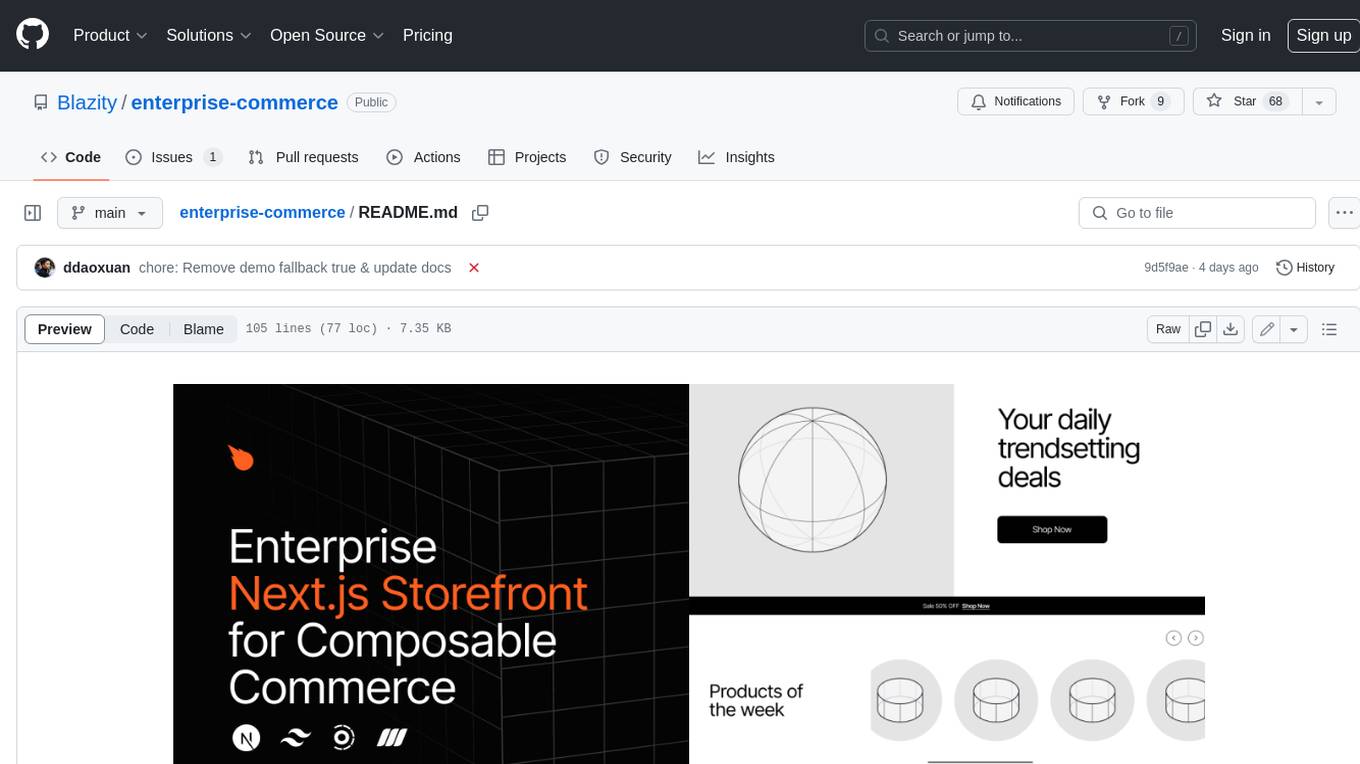
enterprise-commerce
Enterprise Commerce is a Next.js commerce starter that helps you launch your high-performance Shopify storefront in minutes, not weeks. It leverages the power of Vector Search and AI to deliver a superior online shopping experience without the development headaches.

pluto
Pluto is a development tool dedicated to helping developers **build cloud and AI applications more conveniently** , resolving issues such as the challenging deployment of AI applications and open-source models. Developers are able to write applications in familiar programming languages like **Python and TypeScript** , **directly defining and utilizing the cloud resources necessary for the application within their code base** , such as AWS SageMaker, DynamoDB, and more. Pluto automatically deduces the infrastructure resource needs of the app through **static program analysis** and proceeds to create these resources on the specified cloud platform, **simplifying the resources creation and application deployment process**.

